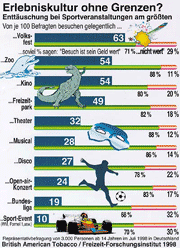Experience culture in the test
Biggest disappointments at sporting events
The Bundesliga is booming, the theatre in crisis? The public debate is deceptive. Only just under a fifth of the population (19%) attends Bundesliga matches, while almost one in three Germans (32%) go to the theatre. The differences in audience ratings are even greater: 12% of theatre-goers return home disappointed, whereas the level of dissatisfaction is significantly higher when attending football matches. One in three spectators (32%) states: "The visit was not worth the money." This is the result of a recent representative survey by the Leisure Research Institute of British American Tobacco, in which 3,000 German citizens aged 14 and over were asked in July 1998 about their attendance at and assessment of events in the fields of sport, culture and entertainment.
"An audience hungry for experience demands more and more," says Institute Director Prof Dr Horst W. Opaschowski. "Something has to happen. The emotional kick is just as important as the professional footballers." But inflated expectations can quickly turn into disappointment. One in ten Germans (10%) has already experienced a "sporting event" - from the Football World Cup to the Tour de France to a Formula 1 race. Just under a third of spectators (30%) are disappointed at the end because the excitement and sensation of the event do not live up to the promise or the thrills they expect. Sport can become a victim of its own "higher-further-faster" philosophy. In no other area of experience is the level of dissatisfaction as high as here.
In contrast, more than one in two Germans (54%) go to the cinema more often. Almost all cinema-goers (88%) also return home happy and satisfied. Musical and open-air concert-goers report similar satisfaction rates (88% and 83% respectively). And the vast majority of respondents also think that a visit to the zoo or amusement park is worth the money (88% and 82% respectively).
The high level of disappointment in the sports sector is largely due to the fact that spectator sport is increasingly turning into tele-sport: Sport can be perfectly staged on television. Live spectators in the stadium or on the racetrack are then often disappointed to realise that the reality of sport cannot offer this at all. Professor Opaschowski: "There is a great danger that TV sport is more about show and spectacle and that the spectator culture falls by the wayside. Television is always there live, but the spectators are degraded to background noise." The boom could one day turn into a boomerang. If more cultivated boredom is on offer than the expected "ultimate match" (Boris Becker), viewers will increasingly stay at home in future. The fact that the vast majority of young people between the ages of 14 and 29 have never attended a Bundesliga match (72%) or any other sporting event (82%) should give us pause for thought.
"Luxese" - a new German way of life?
Saving on clothes and food, more money for events
Germans have less and less money at their free disposal. Savings have to be made everywhere. And yet, what Germans save on everyday things in life, they obviously spend again to the same extent in the area of experience consumption. The growing experience culture is benefiting from this change. The supposed contradiction is resolved in the Germans" new art of living: "Luxese" - sometimes luxury and sometimes asceticism, a balancing act between saving and wasting. In this respect, the "age of saving" and the "age of experience" are not opposites.
The textile and retail sectors are particularly affected by the change in consumer priorities. Subjectively speaking, financial restrictions are becoming easier and easier here. As recently as 1991, two out of five Germans (40%) stated that "financial savings are most difficult" when it comes to spending on clothing. Today, this consumption priority has fallen significantly to 36 per cent. The household budget for food and drink has also suffered a slight decline in importance (1991: 53% - 1998: 52%).
With real incomes stagnating, the cut-throat competition is also becoming tougher within experience consumption. Contrary to expectations, consumer electronics has only increased by one percentage point in recent years (1991: 18% - 1998: 19%). And while the cultural sector (cinema, theatre, opera, concerts) has been able to consolidate its position (1991: 14% - 1998: 16%), sport is showing a slight downward trend in consumer favour (1991: 13% - 1998: 12%). By contrast, the consumption priorities for holidays (1991: 40% - 1998: 43%) and cars (1991: 34% - 1998: 39%) have risen significantly. Experience consumption is increasingly perceived as quality of life. Opaschowski comments: "The decisive motivation is no longer material need, but the psychological desire to indulge in experiences."
When it comes to consumer decisions, however, women and men are "worlds apart": For women, spending money on clothes (44%) is just as important as spending money on holidays (44%), while men feel quite comfortable in the role of "clothes grouch" (27%) in order to be able to put more money aside for "their" car (46%).
It is foreseeable: The "and-and-and" consumer of the 80s and 90s (TV + video recorder + second car + holiday trip) is increasingly developing into the "here-more, there-less" consumer. Today's consumer resembles a split personality who is just as adept at saving as he is at wasting. However, the new art of luxurious living does not come for free: It means sacrificing mediocrity, being able to afford quality and luxury, but having to accept cheap goods and sacrificial purchases in other areas. "Cheap" and "expensive" are no longer opposites for today's consumers.



